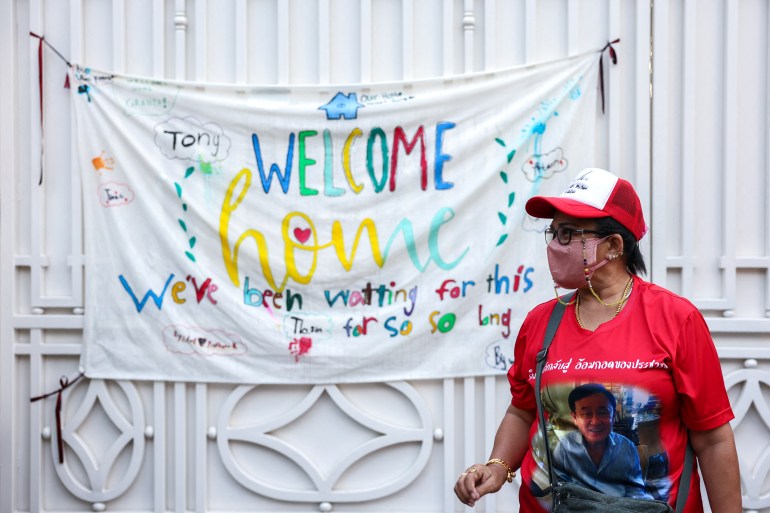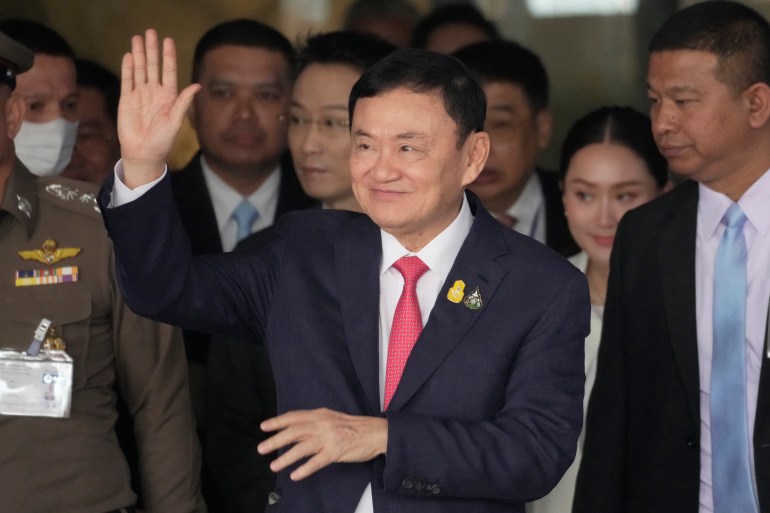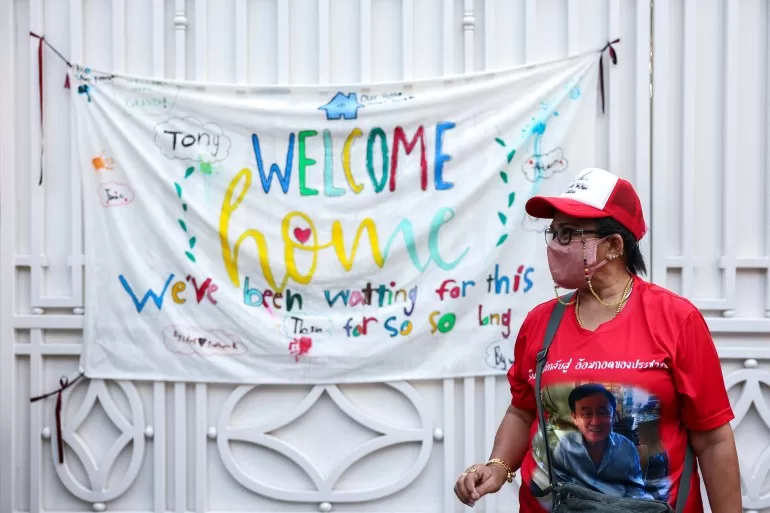Thaksin’s release, the culmination of a period of reconciliation between his populist movement and the country’s conservative establishment, raises questions about what role the former telecoms tycoon might play in Thai politics going forward.
Thaksin, a towering but divisive presence in Thai politics whose populist policies appealed to rural dwellers who felt neglected by the country’s ruling elites, led Thailand between 2001 and 2006, when his government was toppled in a military coup.
Even after fleeing the country in 2008 to avoid punishment for abuse of power and other offences while in office, Thaksin, 74, exerted a looming presence over politics in Thailand.
Thaksin’s sister Yingluck Shinawatra served as Thailand’s first female prime minister from 2011 until 2014, under the banner of the Pheu Thai Party, which was born out of the remnants of Thaksin’s Thai Rak Thai.
Thaksin’s return to Thailand in August following nearly 16 years of self-imposed exile coincided with the Pheu Thai Party’s return to power after it formed a coalition government with the pro-military Palang Pracharath Party and United Thai Nation led by Prime Minister Srettha Thavisin.
The Move Forward Party, the winners of elections in May, were blocked by the military-appointed Senate from forming government amid an establishment backlash to proposed reforms to the military and the monarchy, including a pledge to amend Thailand’s controversial lese-majeste law.
The timing of Thaksin’s return and his receipt of a royal pardon, which reduced his eight-year sentence to one year, has led to speculation that a secret deal was made to allow him to come home on favourable terms.
Move Forward, the leader of the opposition in parliament, said in a statement on Sunday that the circumstances of Thaksin’s release raised questions about whether there are double standards in the justice system.
The Pheu Thai Party, which is led by Thaksin’s daughter Paetongtarn, has denied striking a deal to win the former prime minister leniency.

For supporters of Thaksin, whose arrival at his home in western Bangkok on Sunday was met by a scrum of media and well-wishers, his release is a small measure of justice for a man unfairly hounded for taking on the establishment.
Peemai Sirikul, a Thaksin supporter, said the former leader’s release meant “mission accomplished”.
“He shouldn’t have been punished as he did nothing wrong, – it’s because of the coup d’état,” she told Al Jazeera.
“Thaksin lost his life unfairly for 17 years.”
Others see Thaksin as a recipient of special treatment.
Within hours of being sentenced last year, Thaksin complained of health issues and was transferred from prison to Bangkok’s Police General Hospital where he spent the next six months.
While the exact conditions of Thaksin’s parole are unclear, local media have reported that he is expected to spend the remainder of his one-year sentence at home.
On Sunday, dozens of protesters gathered outside Thailand’s Government House to object to Thaksin’s parole. One activist wore a makeshift sign stating, “Where is Thaksin the prisoner?”
Pichit Chaimongkol, the leader of the Students and Peoples Network for Thailand Reform, said he wants to see justice.
“Thaksin didn’t go to the right jail. He took a rest and was very comfortable,” he told Al Jazeera.
“Against the politics of Thailand and every law, we say he should go to the right jail. We are asking for real justice from the government. Thaksin did some wrong things, so how does he have the right to be very comfortable and not go to jail?”
Mark S Cogan, an associate professor of peace and conflict studies at Kansai Gaidai University in Japan, said Thaksin’s release sends the wrong message.
“Thaksin’s release sends a terrible message to the Thai people, that there are criminal repercussions for violations of draconian laws, which have ensnared many human rights and democratic activists, but rich, connected elites like Thaksin, who were once accused of serious crimes, have an offramp and an escape back into wealth and power,” Cogan told Al Jazeera.

Thailand experienced major political unrest in 2020 and 2021 as large street demonstrations called for a change in government and reform of the monarchy.
In recent years, hundreds of people have been arrested under Thailand’s lese-majeste law, known as Article 112, which carries lengthy prison terms for defaming, insulting or threatening the monarchy.
Cogan said that Thaksin is likely to again get involved in Thai politics following his release.
“Now a relatively free man, he will inevitably reinsert himself into national affairs, calling into question the legitimacy of the Srettha government due to his control over the Pheu Thai Party,” he said.
But Thitinan Pongsudhirak, a political science professor at Chulalongkorn University in Bangkok, said Thaksin may not have the influence he once did.
“Thaksin is seen as having sold out by some of the Pheu Thai base by forming government with pro-military parties and cutting a deal with the establishment just to get himself home,” he told Al Jazeera.
“His commuted sentence from eight years to one and then to be paroled in six months without a day in jail will reinforce the sense of inequality and injustice. His extraordinary stand-alone treatment is unlikely to boost the Pheu Thai’s popularity.”
“Thaksin’s political power is much less than it used to be after all the ups and downs over two decades,” Thitinan added.
“His Pheu Thai party is not so dominant now as it lost the election for the first time last May to Move Forward.”
Despite his parole, Thaksin is not completely out legal jeopardy.
On Monday, the billionaire ex-prime minister met with prosecutors investigating a royal insult complaint stemming from remarks he made in South Korea in 2015.
Thailand’s attorney-general’s office said in a statement that further investigation would be needed before deciding on charges.
Pravit Rojanaphruk, a journalist and political analyst, said Thaksin’s release ultimately brings more questions than answers.
“The question, if his health permits, is what kind of role will Thaksin play? Will he take a de-facto driver seat and direct the Pheu Thai government’s policies in a very public way through posts on social media, thus risk making Srettha Thavisin look like a marionette?” Pravit told Al Jazeera.
“Or will he be content with working quietly behind the scenes as kingmaker and supreme adviser of the government and the Pheu Thai Party?”
